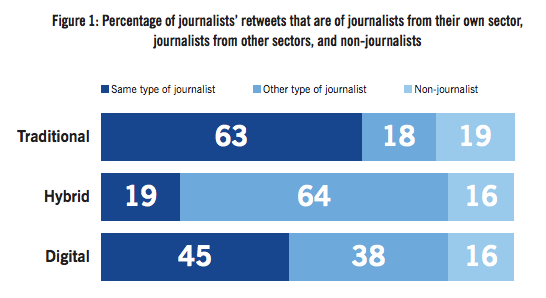As CNN political reporter Peter Hamby has aptly noted, Twitter has replaced the campaign bus as the place where political reporters swap information and where media narratives develop. The proportion of journalists on Twitter is roughly three times that of internet-using adults. Still, there has been little academic study of how news organizations or the journalists they employ actually use the social media network.
The Tow Center for Digital Journalism helped to begin filling that void Thursday with a study of how political reporters interact on Twitter. Researchers analyzed retweets by five writers each at The New York Times, BuzzFeed, and Politico who boasted the largest Twitter followings among political reporters at their respective outlets. The aim was to probe differences between social media use of journalists at traditional media, new media, and media with a foot in both worlds.
The findings: 63 percent of Times reporters’ retweets came from legacy media, whereas 45 percent of BuzzFeed reporters’ retweets hailed from the digital sphere. Perhaps as interestingly, 36 percent of BuzzFeed staffers’ retweets were of their own coworkers, compared to 21 percent of those at the Times.

The study has a small sample size — just 15 political reporters — perhaps preventing broader conclusions about Twitter use by journalists. What’s more, it’s riddled with glaring factual errors: The Times’ Jonathan Martin is described as three different people in three separate instances; and its assertion that “These organizations are not hiring or promoting women or people of color” belies the three outlets’ current leadership, industry-wide struggles with diversity notwithstanding.
Nevertheless, Tow’s report helps quantify two important facts of media life: Cliques reign on the social Web, and digital journalists aren’t as reliant on their legacy counterparts as one might have formerly guessed.
It’s almost fitting that political writers responded to the study with a flurry of derisive tweets on Thursday: How could an outsider possibly understand their own community? Of course, the social network is a place of contradictions. Journalists on Twitter not only protect their own — as this report suggests — but also take few prisoners.

